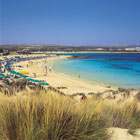Ammochostos Area (Famagusta)
The Golden Beaches

With its superb golden sandy beaches, this area has become a big draw for sunseekers. But this part of the island traditionally remains the market garden of Cyprus, with the well-known Cyprus potato being the prominent crop. Agia Napa, once a small fishing village, boasts a superb Venetian period decorated monastery with a central octagonal fountain. It lends character and substance to a village that's better known to holidaymakers for its colorful shops, tavernas, clubs and bars. A small Marine Life Museum presents exhibits of past and present marine fauna. The focal point of the resort is the small harbour, where the tavernas specialize in fresh fish harvested by the colorful fishing vessels.
Life in the south eastern corner mostly revolves around the sea, and water sports of all kinds are readily enjoyed - from scuba diving to paragliding. Protaras has built up a deserving reputation for its windmills and glorious beaches. The small, white-washed town of Paralimni, slightly inland, has a number of open-air, unspoiled tavernas know for their delicious local cuisine.
Cape Grego, on the very tip, has its own share of beaches and coves. With its contrasting rugged countryside, the dramatic fiery glow of sunsets from this spot have to be seen to be believed. Small churches dating from the 13th and 16th centuries are found in Sotira and in nearby villages. The skillful craft of basket-making still carries on at Liopetri. The fishing shelter at Potamos Liopetriou, just east of the village of Xylofagou, is a photogenic inlet where fishermen mend their nets by day, before setting sail in the evening to farm the sea.
Life in the south eastern corner mostly revolves around the sea, and water sports of all kinds are readily enjoyed - from scuba diving to paragliding. Protaras has built up a deserving reputation for its windmills and glorious beaches. The small, white-washed town of Paralimni, slightly inland, has a number of open-air, unspoiled tavernas know for their delicious local cuisine.
Cape Grego, on the very tip, has its own share of beaches and coves. With its contrasting rugged countryside, the dramatic fiery glow of sunsets from this spot have to be seen to be believed. Small churches dating from the 13th and 16th centuries are found in Sotira and in nearby villages. The skillful craft of basket-making still carries on at Liopetri. The fishing shelter at Potamos Liopetriou, just east of the village of Xylofagou, is a photogenic inlet where fishermen mend their nets by day, before setting sail in the evening to farm the sea.

